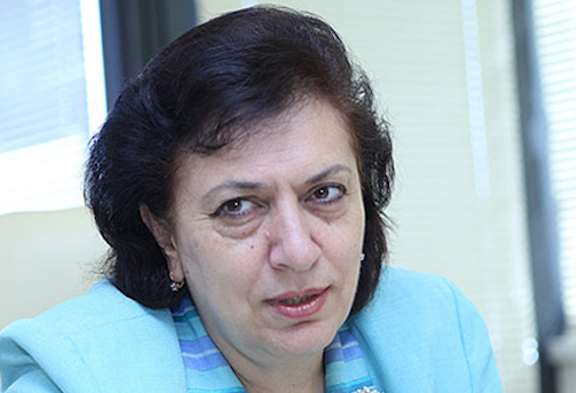
Armenia’s Diaspora Minister Hranush Hakopyan
BY ARIS NALCI
My problems with the mentality of the Armenia’s Ministry of Diaspora started in the early 2000’s, when I was the youngest participant of a Pan-Armenian Media Conference and my surname didn’t end with a “yan” or “ian.”
Because I was the youngest Armenian coming from Turkey, news channels were interviewing me and the first question was always: “Why do you not have an ‘ian’ in your surname?” and whether I was really an Armenian or a Turk who was able to speak Armenian.
It was ridiculous that these questions were being asked by some Armenians in Armenia whose surnames ended with “ova,” as they were not Russian. I was not a Turk. End of story!
During the past 17 years I have had very close relations with Armenia. My best friends–politicians, locals, business people, journalists—were from there,. I don’t want to mention all my great friends who are still there. They were always welcomed in my home (wherever it was).
I even worked in Armenia for almost a year in 2008, writing for several publications, as I set out to discover the mindset of the “New Armenia.” After that, during my frequent trips to Armenia, I was always struggling with this concept of the Diaspora Ministry. But the first seed was planted in 2,000, with often problematic undertones.
First, the ministry decided that Russian Armenians and those of us from Turkey would be classified as the “internal Diaspora.” Despite my queries, I have never understood how that classification came to be or who took that decision. However, they still use this as policy.
Second, I always thought that Armenia’s Diaspora Minister should be a powerful person from the Diaspora who will unify Armenians around the world and not divide them.
The President of Armenia governs the country, which has officially around three million citizens and an estimated $2.5 billion budget (based on the recent 2017 projections). The Diaspora Minister, on the other hand, has the responsibility to mange relations between Armenia and its vast Diaspora communities, which are estimated to number seven million people, with different citizenships and backgrounds. It’s budget is part of the aforementioned amount.
Since the inception of the Diaspora Ministry, it has remained an institution whose sole purpose seems to be to honor Diasporan donors and cultural and philanthropic figures.
Several weeks ago, the Diaspora Minister met with a delegation of Belgian Armenians. When I heard about some of the statements she made, I had to verify with several sources.
…And she really said it.
Minister Hakopyan’s remarks contained three tenets, which also signal how the government of Armenia views the Diaspora. She mentioned:
1. Keep your surnames. Don’t change your last names. If you don’t have an “ian” or “yan” in you surname, you are not Armenian.
2. Don’t will your wealth to your kids. Give your wealth and assets to Armenia, because your children will spend their inheritance on drugs and other such things.
3. And in return, we will teach you how to be an Armenian.
I verified this with three different people and they all concurred that the message from Armenia’s Diaspora Minister to her brothers and sisters from Brussels was, in fact, the above.
I shared my very deep concerns with my friend, Bedo Gesaratsi, who said: “So it seems Toros Roslin (Թորոս Ռոսլին) , Grigor Tatevatsi (Գրիգոր Տաթևացի), Anania Shirakatsi (Անանիա Շիրակացի), Movses Khorenatsi (Մովսես Խորենացի), Mkhitar Gosh (Մխիթար Գոշ) & Frik (Ֆրիկ) were NOT Armenians according to the Ministry of Absurdity.”
In the same conversation with the Belgian Armenians, the minister also mentioned that she liked Armenians from Turkey.
So as an Armenian who doesn’t have an “ian” or “yan” in his last name, I would like tell our esteemed minister, that we Armenians from Turkey are not bothered that some of us do not have the “ian” or “yan” suffixes in our last name, because our names don’t make us Armenian, our blood, our culture and other more meaningful facets do, which perhaps your ministry hasn’t considered.
Let me mention some names, Hrant Dink, Hagop Ayvaz, Gullu Agop, Garo Paylan (politician), Selina Dogan Özuzun (politician), Hayko Bagdat (writer/journalist), Karin Karakasli (writer), Ohannes Kilicdag (academics), Arus Yumul (academics), Arsaluys Kayır (academics), Misak Toros (artist), Diran Bakar (lawyer) and this list goes on. These are the names that come to mind instantly when I think about Armenians in Turkey.
And don’t think that this phenomenon is limited to Armenians in Turkey. Let’s make another list that starts with Charles Aznavour…
Interestingly, the minister has also spoken about the plight of the “Islamized” Armenians, who she would like to help. For that, however, she has to recalibrate the coda that, according to her, defines our nation.
But, first and foremost, I believe that the minister of Diaspora should resign her position, since she is not the minister of “non-ians.”
Aris Nalcı (b. 1980) lives in Istanbul and Brussels. He worked as a writer, then as an editor of the Turkish Armenian daily Agos until 2011. His articles have been published in several mainstream newspapers and magazines in Turkey.
Source: Asbarez
Link: Armenia’s Diaspora Minister Makes Puzzling Assertions
